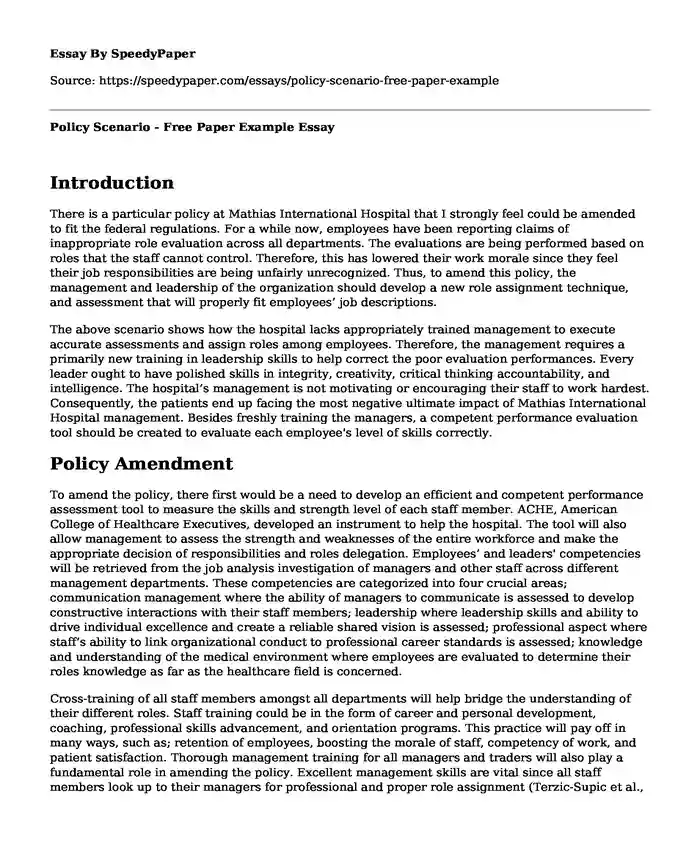
| Type of paper: | Essay |
| Categories: | Policy Health and Social Care Motivation Leadership management |
| Pages: | 4 |
| Wordcount: | 834 words |
Introduction
There is a particular policy at Mathias International Hospital that I strongly feel could be amended to fit the federal regulations. For a while now, employees have been reporting claims of inappropriate role evaluation across all departments. The evaluations are being performed based on roles that the staff cannot control. Therefore, this has lowered their work morale since they feel their job responsibilities are being unfairly unrecognized. Thus, to amend this policy, the management and leadership of the organization should develop a new role assignment technique, and assessment that will properly fit employees’ job descriptions.
The above scenario shows how the hospital lacks appropriately trained management to execute accurate assessments and assign roles among employees. Therefore, the management requires a primarily new training in leadership skills to help correct the poor evaluation performances. Every leader ought to have polished skills in integrity, creativity, critical thinking accountability, and intelligence. The hospital’s management is not motivating or encouraging their staff to work hardest. Consequently, the patients end up facing the most negative ultimate impact of Mathias International Hospital management. Besides freshly training the managers, a competent performance evaluation tool should be created to evaluate each employee's level of skills correctly.
Policy Amendment
To amend the policy, there first would be a need to develop an efficient and competent performance assessment tool to measure the skills and strength level of each staff member. ACHE, American College of Healthcare Executives, developed an instrument to help the hospital. The tool will also allow management to assess the strength and weaknesses of the entire workforce and make the appropriate decision of responsibilities and roles delegation. Employees’ and leaders' competencies will be retrieved from the job analysis investigation of managers and other staff across different management departments. These competencies are categorized into four crucial areas; communication management where the ability of managers to communicate is assessed to develop constructive interactions with their staff members; leadership where leadership skills and ability to drive individual excellence and create a reliable shared vision is assessed; professional aspect where staff’s ability to link organizational conduct to professional career standards is assessed; knowledge and understanding of the medical environment where employees are evaluated to determine their roles knowledge as far as the healthcare field is concerned.
Cross-training of all staff members amongst all departments will help bridge the understanding of their different roles. Staff training could be in the form of career and personal development, coaching, professional skills advancement, and orientation programs. This practice will pay off in many ways, such as; retention of employees, boosting the morale of staff, competency of work, and patient satisfaction. Thorough management training for all managers and traders will also play a fundamental role in amending the policy. Excellent management skills are vital since all staff members look up to their managers for professional and proper role assignment (Terzic-Supic et al., 2015). Therefore, leadership training would significantly impact active communication, proper team culture development, and conflict resolution among staff members.
Motivation
In order to uplift staff morale and motivation to reach their highest growth level, the management needs to establish reward programs for excellent performances. These recognition systems should relate to the hospital's main goals and objectives. These rewards could come in the form of pensions, free insurance covers, allowances, vocational trips, monetary gifts, or salary increments. Such rewards will motivate employees’ efforts towards achieving the hospital’s mission. According to Maslow’s theory, an individual's self-esteem needs to be boosted first before meeting any higher goals (McLeod, 2007). Hence, the management must appreciate the best performers to build their confidence and to encourage other staff members to work harder continuously.
The success of an organization entirely depends on its management and leadership structure. The firm's objectives would be to be fully satisfied with managers who are goal-oriented, creative, innovative, lead by example, and above all who are well skilled. The leadership at the hospital should acquire democratic, participative, and shared leadership styles that will allow every staff member to engage and participate in any decision-making process actively. As a result, employees will have a platform to address their concerns and discuss their roles and responsibilities.
Conclusion
Generally, the leadership at Mathias International Hospital ought to conduct a self-evaluation on each manager and supervisors to ensure they have appropriate managerial skills. This will help them accurately lead their staff to demonstrate their roles responsibly. An effective assessment tool, such as ACHE, should be employed to evaluate each staff's strengths and weaknesses to delegate roles accordingly. Lastly, a rewarding system needs to be established to motivate employees and boost their self-confidence. These implementations will allow the hospital to offer high standard healthcare services to patients.
References
American College of Healthcare Executives. (2009). ACHE healthcare executive competency assessment tool 2009.Retrieved from
https://www.ache.org/-/media/ache/career-resource-center/competencies_booklet.pdf
McLeod, S. (2007). Maslow's hierarchy of needs. Simply psychology, 1, 1-8. http://www.simplypsychology.org/simplypsychology.org-Maslows-Hierarchy-of-Needs.pdf
Terzic-Supic, Z., Bjegovic-Mikanovic, V., Vukovic, D., Santric-Milicevic, M., Marinkovic, J., Vasic, V., & Laaser, U. (2015). Training hospital managers for strategic planning and management: a prospective study. BMC medical education, 15(1), 25.
https://link.springer.com/article/10.1186/s12909-015-0310-9
Cite this page
Policy Scenario - Free Paper Example. (2023, Oct 28). Retrieved from https://speedypaper.com/essays/policy-scenario-free-paper-example
Request Removal
If you are the original author of this essay and no longer wish to have it published on the SpeedyPaper website, please click below to request its removal:
- Essay Sample: Clinical Update for Mechanically Ventilated Patients
- Free Essay on Autism Impairment
- The Vasa Case Study - Free Essay in Project Management
- Essay Sample on Sex Work in the Streets: Prostitution Defined
- Paper Example. The Need for Health System That Creates Value in the United States
- Essay on Improving Consulting Proposal: Addressing Critical Aspects
- Free Paper Sample on Old Living
Popular categories




